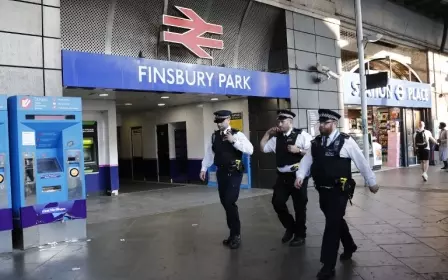Finsbury Park: May defends Prevent from faith leaders' criticism

Theresa May faced criticism by Muslim leaders of Britain's Prevent anti-radicalisation strategy during a private meeting at a north London mosque reeling from a van ramming attack.
The meeting was called by the British prime minister on Monday to reassure local community leaders after the attack on worshippers leaving the Muslim Welfare House in Finsbury Park after Ramadan prayers. Ten people were injured and one man died of a heart attack.
In a recording of the meeting, obtained by Middle East Eye, Muslim Welfare House chief executive Toufik Kacimi criticised Prevent.
"I think the government needs to look again into the Prevent strategy, unfortunately, because the Prevent strategy is definitely not working," said Kacimi.
"The strategy is bringing more harm to the community and with the media, the government should act to address the messaging and titles that are doing more harm to us."
The prime minister said despite focusing on "Islamist extremism", Prevent was also pivotal in targeting growing far-right extremism.
"Good focus on Prevent is to do with Islamist extremism, but actually a good chunk of it is about far-right extremism... so we do recognise the threats of extremism of all sorts," she said.
The Home Office was reported to have said earlier this year that a quarter of referrals to Prevent were related to far-right extremism, but the majority related to "Islamist extremism".
Youth leaders in the meeting also expressed their criticism of Prevent.
"There seems to be a blurring of the lines between a strong religious Muslim identity and extremism."
Mustafa Dabbagh, Youth Leader of Muslim Association of Britain
Mustafa Dabbagh, a youth leader at the Muslim Association of Britain who attended the private meeting, said Prevent helped contribute to the "demonisation of Muslim youth".
"The Prevent strategy more than anything is affecting Muslim youth," said Dabbagh. "This strategy may be working on far-right extremism, but we see the more apparent side... the demonisation of Muslim youth.
"There seems to be a blurring of the lines between a strong religious Muslim identity and extremism."
Referring to his last comment, Dabbagh spoke of a report released by the security services "about eight years ago" which described "having a strong religious identity is a deterrent to extremism".
Other faith leaders present at the meeting included a coalition of representatives from the local Jewish and Christian communities.
In a speech earlier on Monday outside 10 Downing Street, May said Islamophobia was a form of extremism that must be opposed like any other.
May's spokesman said the prime minister's comments in the private meeting with faith leaders were similar to those in her statement earlier in the day.
May, flanked by the Metropolitan Police Commissioner Cressida Dick, also reassured the meeting of plans to increase security around mosques.
Dick said police took hate crime "very seriously, in all its aspects".
Police have arrested a 47-year-old man, Darren Osbourne of Cardiff, over the Finsbury Park attack.
Stay informed with MEE's newsletters
Sign up to get the latest alerts, insights and analysis, starting with Turkey Unpacked
Middle East Eye delivers independent and unrivalled coverage and analysis of the Middle East, North Africa and beyond. To learn more about republishing this content and the associated fees, please fill out this form. More about MEE can be found here.




